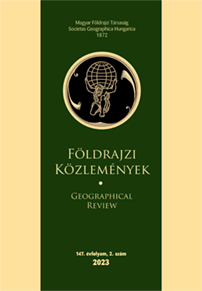Az antropogén éghajlatváltozás hatásainak becslése és elemzése a Ráckevei (Soroksári)-Dunán
Absztrakt
Az antropogén éghajlatváltozás Magyarországon leginkább a felszíni és felszín közeli vizekre gyakorol már jelenleg is közvetlen és közvetett hatást, egyrészt a nyári hőhullámos és száraz időszakok hosszának növekedésével, másrészt a csapadék mennyiségének és éven belüli eloszlásának átalakulásával (DUNKEL Z. 2018). A Ráckevei (Soroksári-) Duna ág (RSD) és közvetlen térsége is rendkívül kitett az éghajlati viszonyoknak és azok hirtelen, vagy tartós megváltozásának, éppen ezért elengedhetetlen a változások irányának és volumenének ismerete, valamint a klímaváltozás komplex problémakörének és hatásfolyamatainak megértése és különböző hatások specifikus vizsgálata. Elemzéseink alátámasztják, hogy az RSD közvetlen térségében az elmúlt évtizedekben is kimutatható az éghajlat megváltozása, valamint a klímamodell szimulációkkal elvégzett számításaink eredményeiből látható, hogy a jövőben a térség éghajlati szempontú sérülékenysége tovább növekedhet, a megfelelő beavatkozások nélkül. Az éghajlat jövőben várható megváltozásának vizsgálatához legfontosabb eszközül a klímamodellek szolgálnak, a szimulációkból származtatott vizsgálatok nélkülözhetetlen segítséget nyújtanak a klímaváltozás negatív hatásainak a mérséklésében és a környezeti, gazdasági stratégiák és válaszlépések kidolgozásában. A legfontosabb RSD-re jellemző extrém időjárási eseményekhez köthető éghajlati hatásfolyamatok feltárásával igazoltuk azt, hogy a hatásfolyamatok exkalálódására lehet számítani a jövőben megfelelő cselekvés nélkül. Az ökológiai szempontból fontos élőlényekre gyakorolt éghajlati hatások, valamint az elővíz minőségét befolyásoló klimatológiai hatások számszerűsítése érdekében olyan éghajlati indikátorokat állítottunk elő és elemeztünk le, amelyek leírják az RSD környezetének aktuális és jövőbeli éghajlati állapotát és információt szolgáltatnak a jelenlegi és jövőbeli klimatológiai viszonyokról, meteorológiai változókról, amelyek közép- és hosszútávon befolyásolják az RSD állapotát. Az RSD-re ható hidrológiai folyamatok számszerűsítésének érdekében, a víztestet befolyásoló Duna vízgyűjtő egy részét magába foglaló területre vonatkozóan is elvégeztünk éghajlati elemzéseket. Ezek alapján meghatároztuk azokat a hatásfolyamatokat, amelyek alapján a legfontosabb beavatkozások megvalósítására is javaslatokat tettünk.
Copyright (c) 2024 Tamás Czira, Lilian Fejes

This work is licensed under a Creative Commons Attribution-NonCommercial-NoDerivatives 4.0 International License.



